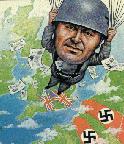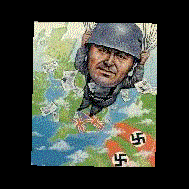|
Back | Next
Chapter 1
Martin Noble, Private Schulz (1981),
London: New English Library, Chapter 1, pp. 9-13
March 1939: Hamburg Prison, Germany
 |  | here was talk of war in the intellectuals' wing these days but Schulz wasn't interested. As far as he was concerned, all war was treason to the self, in which subject he had an intense personal interest. It was not simply |
a question of cowardice, though it was true that
people in authority had always frightened him -
not a good start in life for a German. Certainly
not much help to him in prison.
It was more that Schulz had come to regard
most of the human race as utterly, hopelessly
mad. He had also had an intuition at a very early
age that he was as utterly, hopelessly mad as
everyone else.
It took only a few childhood flights of lunacy
to inoculate Schulz from the more pernicious ef-
fects of this disease. His subsequent immunity
had taken the form of an instinctive fear of the
fanaticism he saw all around him and over the
years this fear had mellowed into what he hoped
was an unobtrusive cynicism, and even a furtive
kind of opportunism. For Gerhard Otto Schulz had
decided that if everyone, including himself, was
utterly, hopelessly mad, he might as well profit
from the insanity.
In a bolder main this might have developed
into arrogance. But the fact of the matter was
that Schulz genuinely didn't like to hurt other
people's feelings, besides which he had decided
it would be prudent not to make known his own
until the time was ripe.
Time ripened erratically with Schulz, like a
distorted clock in a Dali landscape. As a result
he tended to oscillate between long periods of
extreme caution and sudden bursts of genius as he
swung manically close to his own particular sun
on an elliptical orbit through life.
He had, as a child, been made uncomfortably
aware of this tendency and had developed, to pro-
tect himself against its most harmful side eff-
ects, a habitual meekness of manner - which some
construed as slyness - behind which his brain
peeped out at the world like a pre-electronics
pocket calculator. Most of the time it was quiet-
ly content to add up and subtract but at peak
hours it would speed up dramatically, dividing
and multiplying like an amoeba that had struck
lucky, until some automatic fuse within him shut
off the whole thing before it exploded.
On this trembling day in late March, Schulz
and his brain were more in danger of implosion,
such was his apprehension of imminent collision
with a destructive comet. The comet in question
was Herr Untermeyer, governor of Hamburg prison,
down the corridor of which Schulz was now being
marched for his pre-discharge sermon. The stench
of skilly and carbolic and the cocktail of metal
polish and urine turned his stomach, which had
already been prodded mercilessly by the podgy
finger of the head warder, Beck, as though he
were trying to poke one of his rusty keys into a
particular intransigent lock.
'Step! Step! Keep in step!' bellowed Beck,
giving Schulz an extra hard dig as they reached
the governor's office. 'Wait for the Governor!'
he added, as if Schulz were an obedient but over-
affectionate spaniel who couldn't wait to drown
Herr Untermeyer in slobbery passionate licks.
It was the practice for Beck to brief Herr
Untermeyer in advance, hand him the departing
prisoner's dossier and remind him of the prison-
er's good points, so that the governor had them
at his figertips when the prisoner was ushered
into his presence. Schulz had already seen the
Welfare Man who, with childlike innocence, had
formulated his standard diagnosis for all crimin-
al tendencies.
'Misunderstood,' said the Welfare Man.
Schulz would have given him gold for it.
On the other side of the office door he could
hear Beck singing his praises.
'Complete fraud. Thorough bad hat.'
Behind him the cell doors began to clang as
they brought the skilly round on a trolley.
Schulz didn't have any clear idea of what was
happening in the outside world, and he wasn't
entirely looking forward to finding out. It
wasn't that he was suffering from jail fever, the
sort that old lags had, like his friend Ephraim
Solokoff, the Russian-Jewish forger. That kind
had been in so long they were frightened to see
real trees. It was rather that the real world out
there was three years worse.
If that were possible.
The general conversation in the prison canteen
didn't concern itself much with politics, but in
the intellectuals' wing the whisper was going
round that you had to be a Party man to sell an
honest match in the street. Schulz, who had a
university education of sorts, might have put
this more aptly, but he had to admit that the
message was loud and clear. With his record, it
was likely that he would find it difficult to
make a start again and it was therefore all the
more important that he made a correct impression
on Her Untermeyer.
Presently Beck returned, looking inflamed and
frustrated.
'Right - next!' he bawled. Schulz looked round
as though he were at the head of a queue, but
there was only one of him.
'You!' barked Beck. 'Are you blind? Step for-
ward!'
In fact Schulz was a little short-sighted and
for that reason he wore steel-rimmed spectacles
which lent him a slightly owlish appearance,
though some called it crafty. He adjusted them,
his hair, his uniform, and stepped forward.
'Stand before the Governor!'
The door opened and he found himself staring
at a bottle of Schnapps in a bookcase, noticing
Mein Kampf prominently displayed beside it and a
photograph of the Führer on the wall behind, with
a gold eagle above. Herr Untermeyer stood framed
in the middle, a stern-looking man with a close-
cropped iron-grey head.
'So you are leaving us, Schulz?' he said in a
kindly tone.
Schulz had been misinformed. 'Yes, Herr Unter-
meyer,' he said, standing stiff and erect on the
carpet in front of him.
'This was your second term in prison.'
'Yes, sir.'
'The first for defrauding an old lady of her
life savings.'
'I prefer to think, Herr Untermeyer, that I
invested them badly,' Schulz replied with some
dignity. 'I was young and inexperienced.'
Herr Untermeyer nodded slowly, not wholly con-
vinced. 'And this time it was also for fraud. You
raised money, life savings in some cases, to form
a company that was supposed to make gold from
iron oxide and quartz by heating them in an elec-
tric furnace - a chemical impossibility.'
'It wasn't considered so at the time, Herr Un-
termeyer. I think I can truthfully say that our
company was the first to prove, beyond a shadow
of doubt, that it simply couldn't be done!'
'I shall never understand how normally sane
people allow themselves to be fooled so easily,'
Herr Untermeyer sighed. 'Well, I hope you've
learned your lesson. A man of your education and
abilities should amount to something, not spend
his life in prison.'
That was precisely Schulz's intention - but he
was actually thinking along rather different
lines.
'The Welfare Officer has a high opinion of
your intelligence, Schulz. His opinion is that
you are often misunderstood. And I see that you
have a gift for languages that has never been
utilized.'
'Yes, sir. That was my English grandmother.'
'English, French, it says here ... Serbo
Croat? And some Dutch too,' the governor said,
squinting at the form sheet.
'In the diamond business in a small way. Amst-
erdam.' Schulz was wondering where all this was
leading.
'Then there is every hope you may be of some
use to the Fatherland, Schulz?' It was posed more
as a question than a statement.
Nothing was further from Schulz's mind. Not
only was he frightened of people in authority,
but he had never believed in the Fatherland. Of
course, looking back later, he realized that
every German of his age had said this, but in his
case it was genuine.
'Knowing how hard it is for a man leaving pri-
son to find work,' Herr Untermeyer continued,
'I have arranged a post for you with a most civ-
ic-minded employer, a most patriotic man, Herr
Krauss of Krauss Underwear. He is short of staff
due to conscription and will give you employment.
Let us hope that peace will prevail and that you
will make good there.' |

 | n the prison garden, early daffodils stood in file at precisely measured distances like sentries, not a petal out of place. Here was Germany of the old order, thought Schulz, correct to the last detail, |  |
the last measured lump of soil. Even the breeze
came through the courtyard at a precise right
angle, and it could almost be heard marking time.
'One off,' Beck said to the gate officer.
'Herr Schulz.'
Beck smiled his crooked razor-slashed smile,
showing stumps of teeth like lumps of brown sugar
dotted in his gums. He had replaced his cap and
now the visor bisected his face and his eyes
glistened.
'You'll be back,' he said.
Malevolence flooded every vein of his rheumy
eyes like watered red ink.
'Thanks, Beck,' said Schulz.
He was still trembling as he went out through
the gate and the sweet smell of the air did not
calm him. He had been ejected on to the streets
like an unwanted pfennig from a slot machine.
Perhaps at that moment he had an inkling that
he had just finished being an almost-free man ... |

|





